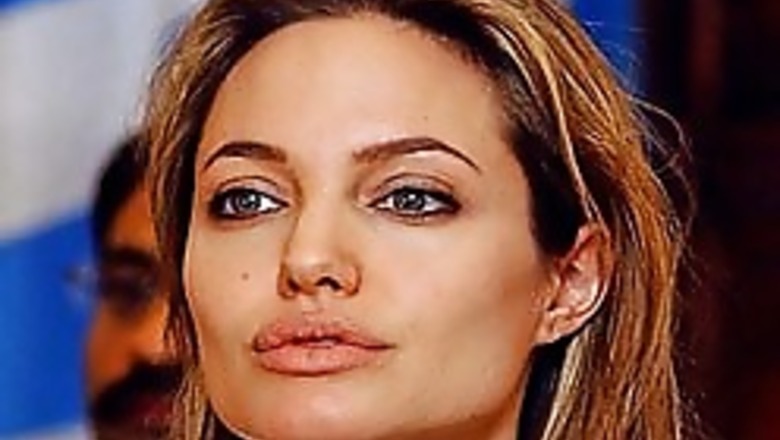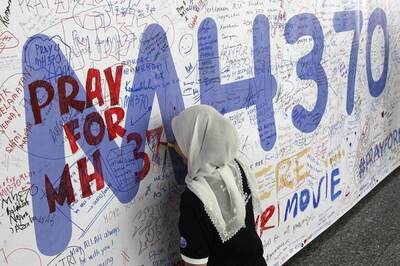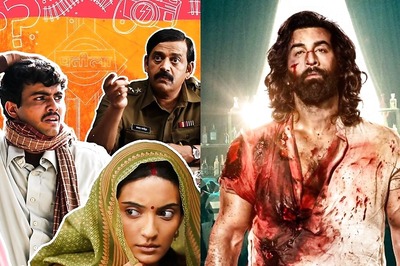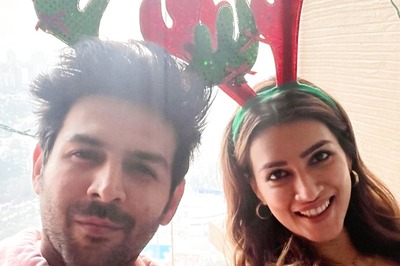
views
It may feel strange at first, but Angelina Jolie says in a sense she has found her place among the needy. She has found a role she feels is the most important work of her life.
Jolie says that she feels most comfortable working with refugees and most uncomfortable if she were in the middle of New York and Washington all dressed up.
Anderson Cooper: At a certain point, some people need to block it out. But you go repeatedly to work with refugees and that takes its toll.
Angelina Jolie: It does, but I am so inspired by these people and they are my greatest strength.
You have that moment, I have had it. Even today, when I was breastfeeding and feeling tired and I was thinking, 'God how am I going to get myself together to be thinking for this interview?', but then you think, the things these people go through, I owe it to all of them to get myself together and stop whining about being tired and get there and get focused. It's the least I can do with what they live with.
They pull themselves out of the most horrible despair. They are still able to smile and get on with it and survive, so you don't think 'Poor me'. For what I have seen, you just think, 'Thank God I'm not experiencing it.'
Anderson Cooper: I've read that you give a third of your income for the cause of refugees. Is that true?
Angelina Jolie: Yes, it is.
Anderson Cooper: Well, that's incredible.
Angelina Jolie: Well, yes I have a stupid income for what I do.
Anderson Cooper: Well, hey, there are a lot of people who have that income and more, but don't do what you do. Do you feel it makes a difference? Do you see change?
Angelina Jolie: Yes, I do. I know it's frustrating for people who are not on the field, because you give money and you don't know where it goes. I've been really lucky because I can go there and I can meet people who say 'God, we really need a well here' and then one year later I can go back and see it built.
PAGE_BREAK
Anderson Cooper: Does it change the way you see your life here? I mean, I can still imagine you walking on a red carpet and giving interviews about a movie.
Angelina Jolie: I did give interviews. Actually after my first trip back, a week later, I had to go to the Golden Globe.
Anderson Cooper: What was that like?
Angelina Jolie: I actually thought I was going to be really bitter. I thought I would come at it with 'God I have seen something that nobody else here understands', but something changed in me and instead I thought ‘God, these people probably have their kids back home nervous, God these people are probably worried about how good they look tonight'. I just saw everybody as human and wished they had the experience that I had.
Anderson Cooper: I've heard these stories of people chasing you and taking photographs. Do you ever just want to yell at them and spend a little bit of money and go to the Congo?
Angelina Jolie: Of course, yes, we've talked about that part, we've joked about it that maybe we could just go somewhere and they can follow us and we force them to go to the Congo.
Anderson Cooper: The first time you went to a refugee camp, what was it like?
Angelina Jolie: It was Sierra Leone, so it was a different kind of a camp. They were still having a civil war and it was just like this area of people who had their limbs cut off.
It was till date, probably the worst camp I had seen and I knew I was changing as a person. I was learning so much about life and in some ways it was the best moment of my life since it changed me for the better.
Anderson Cooper: But how did it change you?
Angelina Jolie: I was very focused on myself, on my career and my life. We have so much and we want other things and we don't realise how grateful we should be.
I had done things like most teenagers. You take you life for granted and suddenly see these people who are really fighting something, who are really surviving, they have so much pain and loss that you have no idea.
As soon as I got to a phone, I called my mom and told her how much I loved her. I was so grateful that I knew where she was, where my brother was. It just changed everything.
PAGE_BREAK
Anderson Cooper: But then how do you come back? I find it always a hard thing that once you're there, you see it, your eyes are open, your heart is open, your mind is open, and then you come back and especially in the world you live in. It's got to be surreal.
Angelina Jolie: By the time I got on the plane and was on the way home, I knew that I would commit to doing something with these people in my life and I knew that it would be the only way to settle it in myself.
Anderson Cooper: I have also read that the United Nations Declaration of Human Rights is very close to you, so literally, that you have a tatoo that refers to it. Is that true?
Angelina Jolie: Yes.
Anderson Cooper: What does it say?
Angelina Jolie: 'Know your rights'. It's on my back.
Anderson Cooper: Why get that tatoo?
Angelina Jolie: It's just something that I have always wanted to have.
Anderson Cooper: Bono uses it in his concerts, and you have taken it to the next step by getting the actual tatoo.
Angelina Jolie: It's really funny because I had accidentally worn a low cut shirt to a prison once and you could see the tattoo. It was very popular there.
Anderson Cooper: Wow, that must have given them something to talk about.
Angelina Jolie: But it's just that that is what it comes down to for all these people, for the refugees, for everybody. It's for them to know what their rights are - for children who are trafficked, for women who are vulnerable, for everybody.
When I started looking at the declaration, you start to see what is right here. Everybody has the right to education and freedom of movement.

















Comments
0 comment